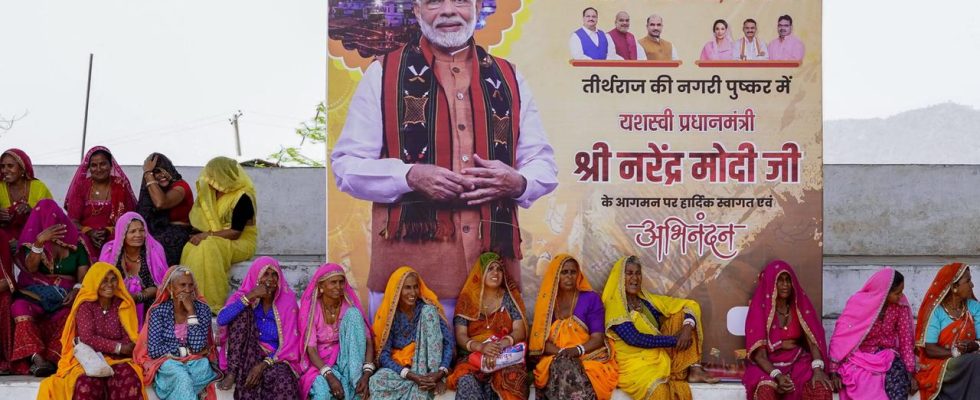analysis
India is electing a new parliament, and Prime Minister Modi is touting economic and social successes. His opponents criticize that poverty has increased under Modi. And they ask about the state of Indian democracy.
Narendra Modi is everywhere: India’s prime minister for ten years smiles good-naturedly on posters, on the country’s hundreds of television channels and even as an advertisement on the app that displays the air quality in the chronically smoggy capital of New Delhi.
Modi is running with his Hindu nationalist party, the BJP, in the mega-election, which will take place in several stages over six weeks. In the 1980s, the BJP started with just two of 543 seats in parliament, says Shazia Ilmi, spokeswoman for the BJP party, proudly.
At that time, India had neither clean drinking water nor sanitation. Today the BJP has an absolute majority with over 300 seats. A lot has been done, says Ilmi and lists: in water supply, in housing, with gas subsidies and the world’s largest nutrition program for poor people.
Success only at first glance?
In fact, at first glance, the numbers paint a picture of the upswing in the country with its over 1.4 billion inhabitants. According to the International Monetary Fund, the Indian economy is expected to grow by 6.8 percent this year, making it the fastest-growing economy in the world.
This is not the only reason why India is courted as a trading partner on the global stage. But also because countries like Germany hope for an alternative to the great power China.
But you only need to look at the streets of New Delhi or into the backyards of the megacity to see that the economic recovery is far from reaching everyone. Because it’s also true that the poorest of the poor are hardly aware of the upswing. The gap between rich and poor has become even greater under Modi.
Corruption, inflation and unemployment
Many students, like 20-year-old Manya, are therefore critical of their government. She is one of the 200 million voters under 30. Corruption, inflation and unemployment are the issues that concern her in this election, says the student. “And I don’t think the government is doing anything about it.”
It is a problem that even the ruling party, the BJP, addressed in its interview with the ARD addresses. Much more needs to be done when it comes to unemployment, admits BJP spokeswoman Ilmi. But India is a big country and nobody has a magic wand. But if anyone could solve these problems, it would be your party.
Aggression towards Muslims
In addition to the economy, the rights of religious minorities are a big issue. Modi’s party promotes India as a Hindu country. In fact, there are more than 200 million Muslims living in India. There are also Christians, Sikhs and people with other religions.
Human rights activists warn that the rights of religious minorities have been gradually being eroded for years. Mosques have been destroyed, Hindu fanatics have marched through Muslim neighborhoods, and dozens of people, mostly Muslim Indians, died in riots last year. The perpetrators often remain at large and appear to have little fear of punishment.
A weak opposition
In addition to Modi, Rahul Ghandi, the face of the largest opposition force, the Congress party, is also up for election. It is a party that is firmly linked to the Gandhian political dynasty. But she appears poorly organized and weak in the election campaign.
Even opposition party spokesmen do not deny this. The BJP has enormous access to money, says Praveen Chakroborty. “And we also have to admit that organizationally it is much stronger than the Congress party.” Modi’s real competition comes from politicians from regional parties who run local governments.
For over a year, cases of opposition politicians being accused of alleged corruption have been increasing. Just last month, Delhi’s chief minister was arrested. He is a well-known critic of the Modi government and a member of an opposition party.
“A real Separation of powers doesn’t exist”
Journalists have also found themselves under increasing pressure for years. One of the few journalists who still report critically and dare to speak in front of the camera is Harthosh Singh from “Caravan” magazine.
State authorities have become an extension of the government, he warns. If undesirable politicians were arrested for alleged corruption, they would be released as soon as they joined the ruling BJP.
And so what is happening in India now looks like a democracy, with millions of people who are allowed to vote. However, there is no real separation of powers, as is necessary in a democracy. State authorities have become government stooges. “It’s not the case that everyone here will be put behind bars straight away,” warns Singh.
Principles such as the separation of powers and checks and balances of democratic institutions have been undermined in much more sophisticated ways. This is also why the actual state of Indian democracy is so difficult for the world to see.

